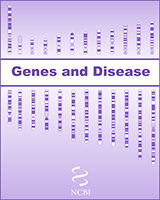NCBI Bookshelf. A service of the National Library of Medicine, National Institutes of Health.
National Center for Biotechnology Information (US). Genes and Disease [Internet]. Bethesda (MD): National Center for Biotechnology Information (US); 1998-.
The endocrine system is responsible for the release of hormones into the blood or lymph. Deficiencies in the endocrine system can be caused by infection, infarction, or a tumor destroying all or a large part of the gland. However, the activity of an endocrine organ is most often depressed as a result of an autoimmune reaction that ultimately results in partial or complete destruction of the gland. Autoimmune disease affecting one organ is frequently followed by the impairment of other glands, resulting in multiple endocrine failure.
Autoimmune polyglandular syndrome type I (APS1, also called APECED) is a rare autosomal recessive disorder that maps to human chromosome 21. At the end of 1997, researchers reported that they isolated a novel gene, which they called AIRE (autoimmune regulator). Database searches revealed that the protein product of this gene is a transcription factor—a protein that plays a role in the regulation of gene expression. The researchers showed that mutations in this gene are responsible for the pathogenesis of APS1.
The identification of the gene defective in APS1 is the first step toward developing tests that will be able to genetically diagnose the disease. Further investigations of the gene and its function should also facilitate finding a potential treatment for the disease as well as increasing our general understanding of the mechanisms underlying other autoimmune diseases.
- Genome view see gene locations
- Entrez Gene collection of gene-related information
- BLink related sequences in different organisms
- Research articles online full text
- Books online books section
- OMIM catalog of human genes and disorders
- American Autoimmune Related Diseases Association research and patient support
- Autoimmune polyglandular syndrome - Genes and DiseaseAutoimmune polyglandular syndrome - Genes and Disease
Your browsing activity is empty.
Activity recording is turned off.
See more...
